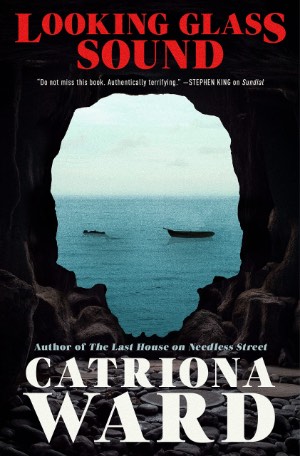
Looking Glass Sound
In my review of Little Eve, I dubbed author Catriona Ward “The Mistress of Marvelous Misdirection” based on the one-two punch of that novel and The Last House on Needless Street. Both feature unreliable narrators and the device is again applied in Looking Glass Sound, a Nightfire publication. Looking Glass Sound further tweaks conventional notions of perception and reality and reaffirms Ward’s talent for keeping the reader intrigued and off base. However, the extremely far-fetched (albeit possibly allegorical) plot and an assemblage of largely unsympathetic characters weaken the narrative. Creating effective ambiguity is akin to walking a tightrope. And even the most accomplished writers can lose their balance.
The plot begins with a portion of a character’s reputedly semi-autobiographical manuscript that focuses on three teens who bond in a small summer vacation town. Reminiscent of a Stephen King coming of age scenario, the town has sinister secrets: Polaroids of sleeping kids with a knife ominously pointing at them. Then there are the unsettling legends regarding the local women who have gone missing. Horrifying discoveries irrevocably change the lives of the focal teens as well as others in their orbit. An account of the happenings subsequently gets published as a work of fiction. The attribution of authorship is a central element of Ward’s plot; exemplifying the trick devices of unreliable narrators that is now synonymous with her method of storytelling. Points of view dispensed by multiple questionable narrators in varying time frames is a literary high wire act. And in this novel, there’s an upping of the ante in terms of stylistic complexity. While admirable in attempt, Ward’s overly elaborate machinations ultimately prove taxing. Credit for creativity but detractions for execution. There is an overextension of contorted nebulousness.
Yet the narrative still has a delicious pull; the compulsion to follow a serpentine path. A twist in the tale is a hallmark of the author. One can never assume that a Catriona Ward story is over until the last page is read. Disclosing too much about the plots of any of Ward’s novels is a disservice to readers. Though it is fair to state what’s obvious concerning my overall impression about the Looking Glass Sound storyline: It reveals a dogged determination to render surprises via transparent overreach. The novel flaunts the author’s renowned cleverness, verbal dexterity, and penchant for surprising swivels. It is nonetheless frustrating. I do look forward to Catriona Ward’s next book and hope that it will be more appealing.

